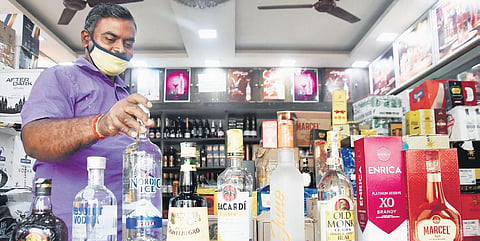

CHENNAI: Though Tamil Nadu has a monopoly over sale of liquor through government-owned Tasmac outlets since 2003, Finance Minister Palanivel Thiagarajan’s recent comment about close to 50% of liquor sale being not covered under excise duty has put the spotlight back on the thriving illegal liquor business industry in the State.
Tasmac, one of the major revenue sources of the government, has paid Rs 33,811 crore in taxes in 2020-21. During this period, nearly 5.1 crore cases of IMFL (Indian-made foreign liquor) and beer were sold by Tasmac. Going by the comment of the FM, more than 10 crore liquor cases, which would have entailed Rs 67,622 Crores tax revenue, have been sold in the State in 2020-21.
According to industry sources, this presumed figure for sale of liquor in black market shows huge loopholes in Tasmac operation and a fertile nexus between politicians, police, commissionerate of prohibition and excise, Tasmac and revenue officials. The illegal trade includes liquor smuggled into TN from other States, liquor manufactured by illegal breweries/ distilleries and booze produced by bootleggers.
L Subramanian, MD of Tasmac, said 1.46 to 1.56 lakh cases of hard liquor and beer are sold per day. “No non-taxed liquor bottle can be sold through Tasmac retail outlets. It’s practically impossible,” he said. The projected sale of liquor for the year 2021-22 is 5.4 to 5.7 crore cases. One case of hard liquor may contain 48 bottles of 180ml each, 20 bottles of 360ml each, or 20 bottles of 720ml each.
A beer case has 10 bottles. Soon after a Tasmac district manager places order, distillery transports it to godowns from where the stocks are shifted to retail outlets. A deputy collector-rank officer deployed by the Tasmac at every distillery/brewery monitors the process of production and transportation.
According to Tasmac sources, liquor production is monitored through CCTVs and weight of each bottle is recorded electronically at every stage. “The officer deployed at the unit cannot alter the quantity manually,” a Tasmac official said, adding that retail shops too are being covered under CCTVs.
Sources from the police prohibition and enforcement wing (PEW) said as many as 45 permanent prohibition check posts and seven mobile check posts are functioning across the State.About 1.65 lakh cases were registered in connection with prohibition offences and 2.95 lakh litres of arrack, 75,720 litres of rectified spirit and 17.53 lakhs IMFL bottles, smuggled from other states, were seized between April 2020 and March 2021.
The quantity of seizure accounts for less than five per cent of liquor sold by Tasmac. “We have established a system to track the production of methanol to stop hooch tragedies. We also track those who purchase Tasmac liquor in bulk and sell it at exorbitant rates,” an official said. A large number of illegal breweries were destroyed in the last two years, added the official.
Considering the negligible seizure of liquor by PEW, industry sources said a major share of black market liquor could have been produced within the State. The liquor is being sold in houses, Tasmac bars and other secluded places after 10pm in connivance with local police. Bribe from Tasmac bars is a major source of earning for police stations.
It would be extremely difficult to sell liquor in black market if Tasmac sells the liquor bottle in its original shape and design meant for the brand. “For example, until eight to nine years ago, popular rum and brandy brands were sold in bottles of original shape that were difficult to copy. But the bottle shapes of many liquor brands (180 ml) were changed to ordinary shape to make illicit liquor production easier,” a source said.
At present, liquor sold at Tasmac comes with a unique sticker. A few months ago the commissionerate of prohibition and excise replaced the hologram stickers on liquor bottles with the QR code sticker which is readable through mobile phones, 2D bar code scanners and hand-held devices. “When I scanned the QR code, I got a 17-digit code but there is no option for checking authenticity of the liquor,” said Rajan Krishnan, a resident.
According to Senthil Arumugam, an anti-liquor activist and State secretary of Makkal Needhi Maiam, without approval from the political leadership, revenue officials deployed at distillery /brewery will not allow illegal production of liquor. “The minister’s admission has confirmed the existence of a nexus between political parties and officials.”
Officials of the commissionerate of prohibition and excise refused to comment.
ALSO WATCH |